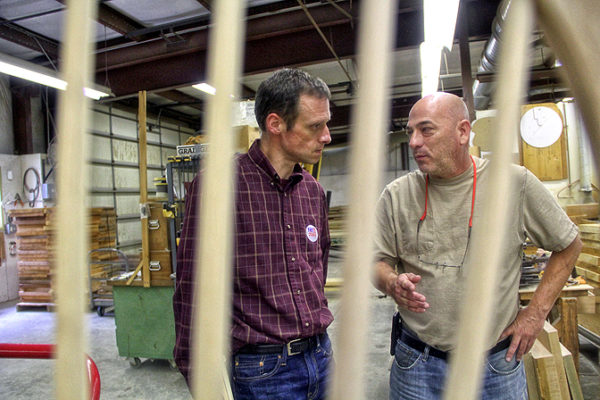| The past few weeks have presented challenges not only here in New Hampshire, but all over the world. The Department of Business and Economic Affairs has already heard from hundreds of businesses and we are working with our federal and state partners to bring forward resources to help address the needs of our business community. We have launched a one-stop resource for businesses needs during this difficult time and it will be updated regularly. Click here to access that information. Governor Sununu requested a disaster declaration from the US Small Business Administration to speed the delivery and access of federal low interest loan products to New Hampshire businesses. On March 18, New Hampshire received a statewide declaration of disaster from the SBA, which means that business in all counties within New Hampshire are eligible for the loan program. More information is available on our web portal. This situation is unlike anything we have seen before. On the upside, we go into this downturn with many strong economic fundamentals. Our goal is to do whatever we can to reduce the financial burden facing businesses across this state in hopes that when we come out the other side of COVID-19, we do so in as strong of a position as possible. I urge you to use BEA and other state resources to help you in this regard. We will not be able to solve every issue, but we are damn well going to try. I say all the time our strength in this state are our communities, and among the most admirable of those is New Hampshire’s business community. I wish you, your families, and your employees the best for whatever is next. BEA and the State of New Hampshire are here if you need us. Respectfully, Taylor Caswell Commissioner Department of Business & Economic Affairs |
Posts Tagged ‘business resources’
COVID-19 INFORMATION FOR BUSINESSES
Friday, March 20th, 2020Business Meeting: Visit with DR Dimes American Furniture of Northwood
Tuesday, August 1st, 2017Mark Laliberte is one of five regional business resource specialists with the New Hampshire Division of Economic Development. He covers the Seacoast.
Reaching out to businesses in all corners of New Hampshire is what I do every day, but I am also here when businesses reach out to me with a question or about how to tap into our business resources.
That’s how I met up with Douglas P. Dimes, president and chief designer at D.R. Dimes American Furniture in Northwood. A few weeks ago, he had a question, I had the answer, and ended up having an opportunity to visit and take a tour of the plant.
He’s the second generation producing 18th century reproduction furniture, incorporating 21st century technology.
“We’ve really embraced CNC machining for the production of our products,” Dimes said. “It’s a passion of mine to make things leaner and more efficient.”
He showed NH Economy a process that increased precision to one-thousandth of an inch, while reducing production time dramatically.
“The customer cares about product, not process,” Dines said, adding that improving the quality of the product also includes a commitment to Lean manufacturing, which, he said, leads to more productivity on the shop floor.
Some well-known restoration projects are furnished by D.R. Dimes, including the Bridges House; the Edward M. Kennedy Institute, for which it created 100 desks, and Harkness tables for Philips Exeter Academy.
“When we see a furniture line or a product we want to build, we work extremely hard to get up-to-speed,” said Dimes. “I see it as a challenge; to quote Calvin Coolidge, ‘Persistence and determination alone are omnipotent.'”
Mark Laliberte
Business Retention
NH Division of Economic Development
Seminars Explore Opportunities Available to NH Companies Via Government Contracting
Thursday, July 27th, 2017Is your business one of the hundreds that brings in billions in federal contracts to New Hampshire every year?
Government contracting offers New Hampshire small businesses a way to expand their customer base selling goods and services to local, state and federal governments. The catch is that doing business with the government has a few more layers that traditional business-to-business.
“Every year, hundreds of New Hampshire companies receive between $1.5 billion to $2 billion in federal contracts alone, with hundreds of millions more from state and local government contracts,” said Dave Pease, program manager for the New Hampshire Government Contracting Assistance Center, part of the state’s Division of Economic Development. “New Hampshire businesses are very successful in winning these types of contracts, ranking 7th in the US and #1 in the Northeast in per capita federal small business contracts.”
No business is too small to get into government contracting, he said.
“Uncle Sam is like any other consumer – it needs the sames services, equipment, supplies that other companies order from your business,” he said.
Winning Federal Contracts – A Great Business Opportunity or a Nightmare will explore how doing business with the government is different than private business; what kind of opportunities there are and where to find them and the resources available for guidance through the process.
The seminar is free, but registration is required at http://nhptap.ecenterdirect.com. For more information, call 271-7581.
Are You Work Ready? WorkReady NH is Ready to Polish Your Skills
Thursday, October 27th, 2016Becoming unemployed unleashes a series of emotions: Diminishing self-esteem; financial concerns and the perceived stigma of being unemployed. Sure, it’s a setback, but not for long. With one of the lowest unemployment rates in the country, New Hampshire is teeming with jobs that need to be filled.
So the question that needs to come at the end of one job should be “What do I do next?” This is where WorkReadyNH, which is paid through the NH Job Training Fund, comes in. This is a three-week course offered at the state’s community colleges, in partnership with NH Works, to help those looking for employment to improve their hard (traditional educational courses such as reading comprehension and math) and soft skills (how to interact with others, active listening, conflict resolution).
WorkReadyNH evaluates existing hard skills and helps people improve, via through online homework, while providing a comprehensive 60-hour classroom course to flesh out and enhance soft skills.
I popped into a WorkReady NH classroom recently, where Christina Wall, the program director for WorkReady NH at Great Bay Community College, arranged for me to go through the course on the day the class was receiving an assessment for reading comprehension and math abilities. Throughout the three week class, the students would learn tips to improve their marketability to potential employers and receive a National Career Readiness Certificate, which is a credential recognized industry-wide to show your strengths in certain subjects.
The first half of the class was about active listening and this is a vital skill employers seek in employees. Both a student and the teacher taught this section, and it generated a great deal of discussion. I used it to evaluate my skills in this area, and found ways I could be more engaged in my approach to conversations.
A subsquent assessment, WorkKeys, evaluated my aptitude in reading, math and research. This was challenging and the results indicated areas in which I can improve, like math. Who knew?
Participating in this WorkReady NH class was enlightening – it made me think how valuable this is to people moving forward from one job into another … and to employers who need the skills these folks now have.
To learn more, check out the WorkReady NH page.
Mark Laliberte
Business Resource Specialist/Seacoast Region
Division of Economic Development
In Search of the Right Data, Collaboration is Key
Friday, September 30th, 2016(Business Resource Specialist Mark Laliberte covers the Seacoast region for the New Hampshire Division of Economic Development. This is an occasional feature highlighting our team’s work with industries and communities. Contact us to connect with your regional business resource specialist. – Ed.)
About a year ago, we collaborated with the Department of Environmental Services, which needed data about the 17 communities in its Coastal Zone for a report being prepared for the New Hampshire Coastal Risk and Hazards Commission. Needed for the report were specific questions regarding job creation, largest industries and gross regional product.
In August, this information had to be updated and augmented with additional data. This was accomplished by Emsi, the economic modeling software we use, as well as by using US Census data suggested by New Hampshire Employment Security.
As a result of this project, the Coastal Risk report will have a comprehensive suite of data. We were also able to provide this information to an area manufacturer, who found it valuable in its employee recruitment and retention efforts.
There is a wealth of valuable data available from many sources. Finding it is the great challenge and in our fast-paced world, agencies and organizations can’t afford the staff time it takes to track down the bits and bytes needed.
Time and again, Emsi provides great information that can make a great difference for our partners in need of it for their projects.
No matter what part of the state you are in, our business retention team is ready to help your organization dive into the data pool for the specific information you need.
Mark Laliberte
Business Resource Specialist
NH Division of Economic Development
Data, Data Everywhere: Our New Tool to Help Drill it Down
Monday, August 22nd, 2016(Business Resource Specialist Mollie Kaylor covers southwestern New Hampshire for the New Hampshire Division of Economic Development. This is an occasional feature highlighting our team’s work with industries and communities. Contact us to connect with your regional business resource specialist. – Ed.)
Municipal and economic development folks are familiar with this scenario: Searching for valuable data to include on that strategic plan or grant application or report quantifying the impact of a new business in the community.
Data is everywhere, but the challenge is finding the right data for your project.
The Division of Economic Development can help. We are subscribed to the economic modeling resource, Emsi, which creates comprehensive labor market information and economic analysis from over 90 federal, state and private sources.
As one of five business resource specialists within the division, I’m out every week meeting with companies and communities about tools they need, including Emsi.
I recently worked with one of the towns in my region as it developed a strategic plan to help established businesses expand and to attract new businesses. Reliable demographic and economic data was needed at all levels – local, regional and national – to determine the trends on which to focus. Working together, we inputted our parameters and were able to generate several Emsi reports containing the best data for this project.
We began by using the Economic Overview report, which we ran several times, each time defining the geographical area differently – U.S., state, county and town. This report provides helpful general information, such as demographic data, the number of jobs by industry, educational information, GRP by industry, import/export by costs by industry, and an overview of growing and declining occupations.
The next reports further explored the seven key southwest New Hampshire industries, identified in the FY 16-17 NH Economic Development Strategic Plan. We ran several industry specific reports, including the Industry Snapshot and Compare Industry across Regions information. All reports, including the comparative report, can be customized, so we were able to define the regions we needed to view. Among the helpful data elements this report provides are projections of the number of overall jobs in the industry, as well as the top occupations.
Another interesting report we used was the Regional Demand for Industry, which identifies the demand for specific industries and whether the demand is met in the region. Finally, we ran a couple different supply chain reports for a look at specific industries’ purchases and sales figures; this supply chain data can be very helpful in identifying potential businesses for the area.
This example includes just a few of the many custom reports our team can work with you to generate. Please don’t hesitate to contact our office if you have a project in mind, or if you would just like some additional information about this useful tool.
Mollie Kaylor
Business Resource Specialist
NH Division of Economic Development
5 Questions with Rich Grogan, New Hampshire Small Business Development Center
Thursday, November 12th, 2015Rich Grogan has been on the run since early last spring, when he became the state director for the New Hampshire Small Business Development Center, a job to which he brings experience and enthusiasm. It’s always good to catch up with him and especially for small business owners here in New Hampshire, he and the SBDC are great resources about which you should know.
1. Congratulations on becoming state director of the NH SBDC! You’ve been in the position for over six months now – what’s the most surprising thing you’ve learned in that time?
Thank you! I’m thrilled to be in my new role, and I’m fortunate to take over for Mary Collins, who left us in a very strong position. She is missed by everyone I meet, but knowing Mary, she’ll continue to work on her many passions around the state going forward.
With respect to surprises, I knew our staff was outstanding but I had no idea how dedicated they are every day to work on behalf of New Hampshire’s businesses. Everyone has been eager for collaboration to build businesses in New Hampshire. I was also surprised at the strength of our National ASBDC network. Other state directors in particular are willing and eager to reach out and support new folks coming into these positions; that has been helpful and appreciated.
Finally, I knew our reputation was strong in the Monadnock Region, where I worked as part of the SBDC at Keene State College, but I was thrilled to find that this reputation extends throughout the state.
2. You’re a North Carolina native who first joined the New Hampshire SBDC as the Keene regional manager three years ago. What do you find particularly compelling about New Hampshire, as it pertains to small business success?
I’m from Winston-Salem, which was hollowed out in the 1980s by the loss of Wachovia Bank, textiles, furniture manufacturing, and rounds of layoffs at the City’s largest corporation, RJ Reynolds Tobacco. What I witnessed as I spent time in the city during college, and visiting since, is the power of small businesses to slowly bring an economy back; Winston-Salem is now roaring. That foundation has propelled me into my current work.
What I find distinct about New Hampshire is the entrepreneurial spirit that exists in everyone, and I mean truly everyone. In my role at Keene State, I met people with very full time jobs who had something they were designing on the side, or a plan to become a consultant utilizing their corporate skills, or similar. This is just amazing to me – we have so much talent across all demographics in New Hampshire that is just waiting to be unleashed!
One of the reasons I love my job now is that as soon as I say what I do, people want to talk to me about their business ideas; they could be 30 or 80, and they are still thinking and working on a better way to do something, a better process, or a business model that they think could work. It opens up a completely different conversation than we otherwise would have had – such an interesting way to be in the world.
3. The NH SBDC is a cooperative venture of the US SBA and the New Hampshire Department of Resources and Economic Development, among other organizations. What does the NH SBDC do for businesses that isn’t already done or offered by the SBA or DRED?
Thanks for highlighting the cooperative nature of our program. Many people don’t realize that we are hosted by the Paul College at the University of New Hampshire and are a cooperative venture of SBA and DRED. I personally think that having all of these as invested stakeholders makes our program stronger, and we get to be a part of multiple teams, all working for the betterment and growth of New Hampshire’s economy.
What we do for businesses as SBDC is really get under the hood with clients, working right beside them over a long-term horizon on all aspects of their business. This includes business plans, preparing to seek capital, building an accounting system, setting a marketing strategy, determining when to hire additional employees, etc. Our suite of services is broad, which means that our staff has to be agile and have multiple threads of intelligence to be able to tackle all of these subjects. The best part is, our services are of no cost to the business owner!
We work a little differently with SBA than with DRED. We are funded through SBA at the federal level, and are an official resource partner. This links us into a network of other SBA resource partners, and allows us to collaborate in ways that are mutually beneficial. For example, the SBA organizes commercial lender roundtables across the state, which helps the SBA understand the lending environment and helps us to understand how we can better serve businesses in a given region. We also share information, work to recognize outstanding businesses, and collaborate on events, such as the upcoming Small Business Matchmaker in December.
The Matchmaker is a good segue to our relationship with DRED, as PTAP (Procurement Technical Assistance Program for government contracting support) is also a partner in that event. This three-way partnership is also a good example, I think, of the difference in New Hampshire … we are so collaborative here.
DRED is also a funding partner, and we work closely with the Division of Economic Development’s resource specialists in the field. The resource specialists are experts at the resources the State of New Hampshire can bring to bear to assist small business growth, and often they will bring the SBDC in to provide technical assistance as part of a broader project to help a business succeed. I like to think that SBDC’s expertise is also a selling point for DRED’s efforts to recruit businesses into the state. We also refer clients to DED who need assistance with understanding statewide resources as a complement to our technical advising. Of course, we love interacting with our DRED colleagues throughout the organization, but we are certainly most closely in sync with DED.
4. Can you share a recent success story or two that illustrate the kind of assistance the NH SBDC provides to small businesses?
I am going to use my answer to this question to shamelessly plug our new website, which went live a couple of weeks ago. The site has clear links to our ongoing catalog of client stories, which highlight the kind of successes about which you asked. One of the wonderful things about our organization is that we work with an incredibly wide range of businesses, so our successes range from manufacturers in the North Country to technology firms in Nashua, and everything and everywhere in between. It is most interesting for me to see us work with, for example, an anchor employer in a community, as I did in Keene, and also work with a retailer that may sell that company’s products in the same town. It’s like getting a glimpse into a rich picture of the diversity of a local economy.
I also want to say a bit about what success means to us. For SBDC, since we work with clients for such a long time, many of our individual days don’t end with a huge splash. Rather, it is victory to see a client get some traction on their marketing plan, start up successfully with a strong foundation, access capital they have been working towards for several months, or any number of similar moves forward. These don’t always create big headlines, but they are cumulative … they are the nuts and bolts of building, sustaining, and growing a small business, and it takes an approach like the SBDC’s to eventually get to that big headline.
5. What’s exciting/interesting/important on the horizon for the NH SBDC?
We are always moving forward at the SBDC and we’ll only be amplifying that culture moving forward. This has been an internally-focused year for us because of a leadership transition (me), a couple of new hires, and our national accreditation this month, which builds continuous improvement into our program. In the coming year, our stakeholders and clients across the state will see the introduction of new e-learning courses, more resources in the field, and a new look and feel for SBDC. As a staff, we’ll be working on a new strategic plan in the first half of 2016, about which I’m very excited. I want us to transition to a short, nimble plan that we can all own and deploy, and that is integrated with the outstanding work that our partners are doing, such as DRED and SBA. Stay tuned!
Grogan Named NH SBDC State Director; Begins April 6
Wednesday, March 18th, 2015Following a nationwide search, Dr. Rich Grogan, PhD has been named the new state director for the New Hampshire Small Business Development Center, succeeding Mary Collins.
The NH SBDC is a co-operative program partnership between SBA, the University Of New Hampshire Peter T. Paul School Of Business and Economics and the Department of Resources and Economic Development. Since 1984, it has provided assistance in more than 200 communities throughout the state and assisted more than 39,000 Granite State entrepreneurs representing over 18,000 businesses.
“The New Hampshire Small Business Development Center is a key link for businesses in various stages of their growth here in the state and one of our valued partners,” said Jeff Rose, Commissioner of NH Department of Resources and Economic Development. “Rich brings a wealth of knowledge and expertise to his new position and will be a great benefit for businesses working with SBDC.”
Grogan, most recently the Keene regional manager for NH SBDC, begins his new position on April 6.
He is a native of North Carolina and before joining the NH SBDC, Grogan was a professor in the MBA in organizational and environmental sustainability program at Antioch University New England. He holds a Bachelor’s degree in business from Wake Forest University; an MPA from the University of North Carolina at Chapel Hill and he earned his PhD in organizational sustainability from Michigan State University.
“I am ecstatic to transition into a leadership position in this organization, especially because I feel that we are in a position of strength. We have an amazingly talented staff, and current State Director Mary Collins’ leadership has positioned us well for the future,” he said. “Entrepreneurship and the growth of small businesses are hot topics right now, and the SBDC, which has been in this business for 30 years in the state, is well positioned to lead the conversation about the growth of this community for the next 30 years and beyond.”
The NH SBDC Lead Center located in Durham, oversees the day to day operations, with satellite offices throughout the state. Its full-time certified business advisors provide one-on-one long-term management advising to small businesses, at no cost to the client. They are experienced business owners or managers, and have been certified through the New England SBDC Professional Development Program.
For more information visit: nhsbdc.org.

















